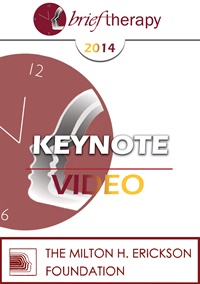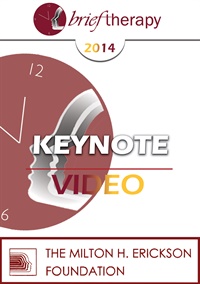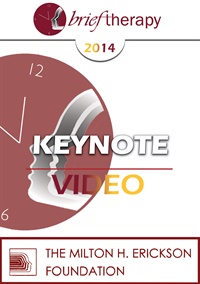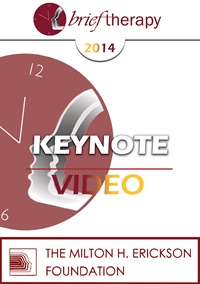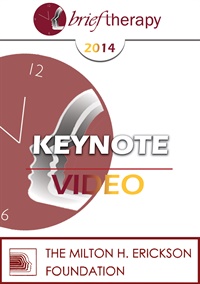- Average Rating:
- Not yet rated
- Topic Areas:
- Keynotes | Addiction
- Categories:
- Brief Therapy Conference | Brief Therapy Conference 2012
- Faculty:
- Patrick Carnes, PhD, CAS
- Course Levels:
- Master Degree or Higher in Health-Related Field
- Duration:
- 1:07:07
- Format:
- Audio and Video
- Original Program Date:
- Dec 08, 2012
- Short Description:
- BT12 Keynote 04 – Bargains with Chaos: Challenges and Choices – Patrick Carnes, PhD, CAS We witness a continuous parade of stars, financial gurus, clergy, politicians and athletes who enter rehabs sometimes repetitively. Is this about media coverage or are these elite canaries in the coal mines of our culture signifying a greater danger? Our understanding of addictions with the aid of neuroscience is expanding dramatically. With it is the realization of cultural and scientific shifts which underline the therapist’s role in facing our number one public health problem. One of the gifts of this challenge is our growth in technology which will transform what every therapist does for a living and maybe how humans evolve. But maybe we professionals are like the famous—reluctant to face difficult realities.
- Price:
- $29.00 - Base Price
Tags: Addiction Neuroscience
- Average Rating:
- Not yet rated
- Topic Areas:
- Attachment | Keynotes | Psychotherapy | Brief Therapy | Couples Therapy
- Categories:
- Brief Therapy Conference | Brief Therapy Conference 2014
- Faculty:
- Sue Johnson, EdD
- Course Levels:
- Master Degree or Higher in Health-Related Field
- Duration:
- 1:03:37
- Format:
- Audio and Video
- Original Program Date:
- Dec 11, 2014
- Short Description:
- There are currently over 400 specific approaches to psychotherapy and many therapeutic tribes. Attachment theory and science with its intrapsychic and relational focus offers the therapist a broad, integrative but systematic guide to the nature of dysfunction and health and how to move individuals, couples and families from one to the other. This presentation will offer a guide as to how this science can help to make our sessions relevant and on target in terms of leading to better affect regulation, cognitive coherence and supportive, stable relationships.
- Price:
-
Sale is $29.00
price reduced from Base Price - $59.00
- Average Rating:
- Not yet rated
- Topic Areas:
- Keynotes | Trauma | Post-Traumatic Stress Disorder (PTSD) | Brief Therapy
- Categories:
- Brief Therapy Conference | Brief Therapy Conference 2014
- Faculty:
- Donald Meichenbaum, PhD
- Course Levels:
- Master Degree or Higher in Health-Related Field
- Duration:
- 58:02
- Format:
- Audio and Video
- Original Program Date:
- Dec 12, 2014
- Short Description:
- Following the exposure to traumatic and victimizing experiences, 75 % of individuals will be impacted, but they go onto evidence resilience and in some instances post traumatic growth. In contrast, 25 % will evidence PSTD and persistent adjustment disorders. In this presentation, Dr. Meichenbaum will discuss what distinguishes these two groups and the implications for treatment decision making. He will use a Constructive Narrative Perspective to demonstrate how to bolster client's resilience.
- Price:
-
Sale is $29.00
price reduced from Base Price - $59.00
- Average Rating:
- Not yet rated
- Topic Areas:
- Keynotes | Couples Therapy | Intimacy | Sex and Sexuality | Attachment | Love
- Categories:
- Brief Therapy Conference | Brief Therapy Conference 2014
- Faculty:
- Esther Perel, MA, LMFT
- Course Levels:
- Master Degree or Higher in Health-Related Field
- Duration:
- 59:13
- Format:
- Audio and Video
- Original Program Date:
- Dec 13, 2014
- Short Description:
- Based on Perel’s Mating in Captivity, this bold take on intimacy and sex grapples with the obstacles and anxieties that arise when our need for secure love conflicts with our pursuit of passion. We will tackle eroticism as a quality of vitality in relationships extending far beyond mere sexuality and show how reconciling these two competing needs is at the heart of sustaining desire over time.
- Price:
-
Sale is $29.00
price reduced from Base Price - $59.00
- Average Rating:
- Not yet rated
- Topic Areas:
- Keynotes | Trauma | Brief Therapy | Neuroscience
- Categories:
- Brief Therapy Conference | Brief Therapy Conference 2014
- Faculty:
- Bessel van der Kolk, MD
- Course Levels:
- Master Degree or Higher in Health-Related Field
- Duration:
- 1:02:01
- Format:
- Audio and Video
- Original Program Date:
- Dec 14, 2014
- Short Description:
- Neuroimaging and EEG measures of traumatized individuals show significant changes that must be taken into account for treatment to be effective.
- Price:
-
Sale is $29.00
price reduced from Base Price - $59.00
Tags: Brief Therapy Neuroscience Trauma
- Average Rating:
- Not yet rated
- Topic Areas:
- Keynotes | Post-Traumatic Stress Disorder (PTSD) | Brief Therapy | Trauma
- Categories:
- Brief Therapy Conference | Brief Therapy Conference 2014
- Faculty:
- Philip Zimbardo, PhD
- Course Levels:
- Master Degree or Higher in Health-Related Field
- Duration:
- 2:05:42
- Format:
- Audio and Video
- Original Program Date:
- Dec 14, 2014
- Short Description:
- For over 20 years, Dr. Zimbardo has researched the power of relationship with time has on our lives. He has co-authored two published books on the topic, The Time Paradox and The Time Cure, and developed the Zimbardo Time Perspective Inventory (ZTPI) which has been translated into over 24 languages and validated globally. his talk will review the major research on time perspective and introduce his work with Dr. Richard Sword and Rosemary Sword on Time Perspective Therapy, a brief therapy intervention to treat Post-Traumatic Stress Disorder.
- Price:
-
Sale is $29.00
price reduced from Base Price - $59.00
- Average Rating:
- Not yet rated
- Topic Areas:
- Keynotes | Domestic Violence | Research | Abuse | Couples Therapy | Relationships
- Categories:
- Brief Therapy Conference | Brief Therapy Conference 2016
- Faculty:
- John Gottman, PhD | Julie Gottman, PhD
- Course Levels:
- Master Degree or Higher in Health-Related Field
- Duration:
- 1:41:28
- Format:
- Audio and Video
- Original Program Date:
- Dec 08, 2016
- Short Description:
- Drs. John and Julie Gottman will present a state-of-the-art review of how to conceptualize and treat the highly intractable problem of domestic violence toward intimate partners. They will review the research literature and present a conceptualization of the issues in treating this population. They will describe a highly successful randomized clinical trial study and the results that demonstrate long-term follow up effectiveness.
- Price:
-
Sale is $29.00
price reduced from Base Price - $59.00
- Average Rating:
- Not yet rated
- Topic Areas:
- Keynotes | Multicultural | Community
- Categories:
- Brief Therapy Conference | Brief Therapy Conference 2016
- Faculty:
- Erving Polster, PhD | Michael Yapko, PhD
- Course Levels:
- Master Degree or Higher in Health-Related Field
- Duration:
- 1:01:39
- Format:
- Audio and Video
- Original Program Date:
- Dec 09, 2016
- Short Description:
- Yapko and Polster examine the idea of “life focus” groups as a natural extension of psychotherapy, designed not for problem-solving but for cultivating reflection, belonging, and continuity in community. Highlighting themes like design, congregation, and continuity, the keynote draws parallels to religion, the arts, and large-scale social movements while imagining new, non-clinical spaces for shared growth. Participants gain a broader vision of how psychotherapy’s principles can inspire communal practices that enhance meaning and vitality in everyday life.
- Price:
-
Sale is $29.00
price reduced from Base Price - $59.00
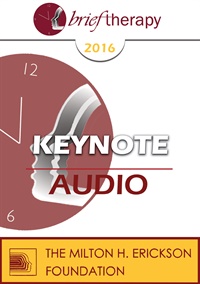
- Average Rating:
- Not yet rated
- Topic Areas:
- Keynotes | Therapeutic Relationship
- Categories:
- Brief Therapy Conference | Brief Therapy Conference 2016 | Pioneers in Couples and Family Therapy
- Faculty:
- Cloe Madanes, HDL, LIC
- Duration:
- 51:26
- Format:
- Audio Only
- Original Program Date:
- Dec 10, 2016
- Short Description:
- Emphasizes the role of transparency in therapy, encouraging therapists to clearly explain their actions and intentions. Case examples highlight the impact of truth-telling, family rituals, and confronting hidden dynamics, including abuse, misdiagnosis, and ethical breaches. Reinforces the idea that honesty—shared even when clients are aware of the strategy—can lead to meaningful insight, accountability, and healing.
- Price:
- $15.00 - Base Price
Credit available - Click Here for more information
- Average Rating:
- Not yet rated
- Topic Areas:
- Keynotes | Meditation, Spirituality and Yoga | Multicultural | Psychotherapy | Religion | Brief Therapy
- Categories:
- Brief Therapy Conference | Brief Therapy Conference 2018 | Online Continuing Education
- Faculty:
- Patricia Arredondo, EdD
- Course Levels:
- Master Degree or Higher in Health-Related Field
- Duration:
- 1:03:49
- Format:
- Audio and Video
- Original Program Date:
- Dec 05, 2018
- Short Description:
- Latinx Immigrants in psychotherapy need to be seen from a strength versus deficit perspective. Across generational differences, there are cultural anchors from the family, spirituality and religion, interdependence, and self-determination that lead to achievements in the midst of adversity. The sociopolitical context and structural barriers to documented and undocumented immigrants need to be recognized as factors of oppression, trauma, and discrimination, yet, Latinx persons persevere for their families, and those they left behind. Because of the Latinx relational orientation, therapists can engage through respectful culture-centered, interpersonal approaches.
- Price:
-
Sale is $29.00
price reduced from Base Price - $59.00
Credit available - Click Here for more information
- Average Rating:
- Not yet rated
- Topic Areas:
- Keynotes | Trauma | Brief Therapy | Meditation, Spirituality and Yoga | Post-Traumatic Stress Disorder (PTSD) | Music
- Bundle(s):
- Learning Track - Turn Down the Trauma
- Categories:
- Brief Therapy Conference | Brief Therapy Conference 2018 | Online Continuing Education
- Faculty:
- Bessel van der Kolk, MD
- Course Levels:
- Master Degree or Higher in Health-Related Field
- Duration:
- 1:06:32
- Format:
- Audio and Video
- Original Program Date:
- Dec 06, 2018
- Short Description:
- This workshop will show how trauma affects the developing mind and brain, and teach how trauma affects self-awareness and self-regulation. We will focus on the fundamental difference between trauma desensitization vs. integration and growth, and look at the difference between disrupted attachment and traumatic stress. We will examine the role of interpersonal rhythms and attunement in establishing a sense of self and community. This workshop will discuss and demonstrate affect regulation techniques, examine ways to deal with fragmented self-experience, and teach the benefits of yoga, EMDR, meditation, neurofeedback, music and theater.
- Price:
-
Sale is $29.00
price reduced from Base Price - $59.00
Credit available - Click Here for more information
- Average Rating:
- Not yet rated
- Topic Areas:
- Keynotes | Brief Therapy | Psychology | Psychotherapy
- Categories:
- Brief Therapy Conference | Brief Therapy Conference 2018 | Online Continuing Education
- Faculty:
- Frank Sulloway, PhD
- Course Levels:
- Master Degree or Higher in Health-Related Field
- Duration:
- 1:03:02
- Format:
- Audio and Video
- Original Program Date:
- Dec 07, 2018
- Short Description:
- BT18 Keynote 03 - Birth Order and Human Behavior: Understanding an Elusive Relationship - Frank J. Sulloway For more than half a century, studies of birth order and human behavior have been mired in disagreement over the existence, magnitude, and specific nature of this relationship. In this talk I argue that much of the previous research in this field has been substantially impeded because birth order is an imperfect proxy for multiple within-family influences that shape personality development within families, but that are overlooked in most studies. Much of the previous disagreements in this field can also be can be attributed to other methodological problems, including a failure to consider individual differences and their sometimes complex interactions with birth order, as well as the role of the behavioral context. This talk presents the results of a novel research design aimed at overcoming these problems and involving 438,251 responses collected using Internet surveys.
- Price:
-
Sale is $29.00
price reduced from Base Price - $59.00
Credit available - Click Here for more information
- Average Rating:
- Not yet rated
- Topic Areas:
- Keynotes | Anxiety | Brief Therapy | Cognitive Behavior Therapy (CBT) | Depression
- Categories:
- Brief Therapy Conference | Brief Therapy Conference 2018 | Online Continuing Education
- Faculty:
- David Burns, MD
- Course Levels:
- Master Degree or Higher in Health-Related Field
- Duration:
- 1:00:36
- Format:
- Audio and Video
- Original Program Date:
- Dec 09, 2018
- Short Description:
- Dr. Burns will describe powerful new TEAM-CBT techniques that can greatly accelerate recovery from depression and anxiety disorders. He will bring these tools with life with dramatic video excerpts from a therapy session with a mental health professional who had been struggling with years of intense anxiety, depression, and guilt.
- Price:
-
Sale is $29.00
price reduced from Base Price - $59.00

- Average Rating:
- Not yet rated
- Topic Areas:
- Keynotes | Marriage | Strategic Therapy | Therapist Development
- Categories:
- Couples Conference 2004 | Couples Conference | Pioneers in Couples and Family Therapy
- Faculty:
- Cloe Madanes, HDL, LIC
- Duration:
- 1:01:11
- Format:
- Audio Only
- Original Program Date:
- Mar 26, 2004
- Short Description:
- Madanes presents strategies for resolving marital challenges that are grounded in core human needs like certainty, love, and growth. She critiques the influence of managed care and psychopharmacology, advocating for a more human-centered therapeutic approach. She encourages therapists to reclaim authenticity, address double binds, and recognize the hidden benefits of despair. She also introduces a collaboration with Anthony Robbins to develop ethical, strategic interventions for lasting change.
- Price:
- $15.00 - Base Price

- Average Rating:
- Not yet rated
- Topic Areas:
- Keynotes | Couples Therapy | Neurobiology | Intimacy | Neuroscience | Attention Deficit Disorder (ADD)
- Categories:
- Couples Conference | Couples Conference 2004
- Faculty:
- Daniel Amen, MD
- Duration:
- 57:26
- Format:
- Audio Only
- Original Program Date:
- Mar 27, 2004
- Short Description:
- This keynote explores how brain function shapes intimacy, trust, and emotional connection in relationships. Participants learn how areas like the prefrontal cortex, temporal lobes, and limbic system influence empathy, impulse control, and attachment. The session offers a brain-based framework for understanding marital conflict, trauma, and communication struggles, showing how optimizing brain health can restore compassion, flexibility, and lasting partnership.
- Price:
- $15.00 - Base Price

- Average Rating:
- Not yet rated
- Topic Areas:
- Keynotes | Love | Couples Therapy | Relational Recovery Therapy (RRT)
- Categories:
- Couples Conference | Couples Conference 2004 | Pioneers in Couples and Family Therapy
- Faculty:
- Terry Real, LICSW
- Duration:
- 59:41
- Format:
- Audio Only
- Original Program Date:
- Mar 27, 2004
- Short Description:
- This talk presents the core principles of Relational Recovery Therapy, focusing on the relational imbalance between men and women. It examines the enduring 50% divorce rate and the impact of traditional gender roles—men socialized for dominance, women increasingly seeking emotional intimacy. The approach calls for therapists to support women’s empowerment while helping men confront grandiosity and develop relational accountability, aiming to foster mutual connection and growth.
- Price:
- $15.00 - Base Price

- Average Rating:
- Not yet rated
- Topic Areas:
- Keynotes | Couples Therapy | Neurobiology | Love | Neuroscience | Sex and Sexuality
- Categories:
- Couples Conference | Couples Conference 2004
- Faculty:
- Helen E. Fisher, PhD
- Duration:
- 1:03:38
- Format:
- Audio Only
- Original Program Date:
- Mar 28, 2004
- Short Description:
- Dr. Fisher will present an fMRI study of intense romantic love, a primary mating drive, and the impact of this brain circuitry on human sexuality, human marital stability and therapy using SSRI antidepressants.
- Price:
- $15.00 - Base Price

- Average Rating:
- Not yet rated
- Topic Areas:
- Keynotes | Couples Therapy | Neurobiology | Neuroscience | Therapist Development
- Categories:
- Couples Conference | Couples Conference 2004
- Faculty:
- Pat Love, EdD
- Duration:
- 58:32
- Format:
- Audio Only
- Original Program Date:
- Mar 28, 2004
- Short Description:
- During the past five years, the field of neuroscience has given us an overwhelming amount of information related to couples therapy. It is now up to us as clinicians to integrate this knowledge into our practice. Join the challenge, as we use these exciting new facts to help couples move from the relational log-jam to lasting change.
- Price:
- $15.00 - Base Price

- Average Rating:
- Not yet rated
- Topic Areas:
- Keynotes | Couples Therapy | Forgiveness
- Categories:
- Couples Conference 2005 | Couples Conference
- Faculty:
- Janis Abrahms Spring, PhD, ABPP
- Duration:
- 52:53
- Format:
- Audio Only
- Original Program Date:
- Mar 04, 2005
- Short Description:
- This keynote reframes forgiveness as a mutual, relational process rather than a unilateral moral duty. Challenging common myths, it distinguishes genuine forgiveness from cheap pardon and introduces “acceptance” as a healthy alternative when offenders are unrepentant or unavailable. Participants learn what repair actually requires from both parties, how apology and accountability restore dignity, and why thoughtful engagement, not quick absolution, leads to real healing and restored connection.
- Price:
- $15.00 - Base Price

- Average Rating:
- Not yet rated
- Topic Areas:
- Keynotes | Couples Therapy | Relational Life Therapy Model (RLT) | Relationships
- Categories:
- Couples Conference | Couples Conference 2005 | Pioneers in Couples and Family Therapy
- Faculty:
- Terry Real, LICSW
- Duration:
- 53:44
- Format:
- Audio Only
- Original Program Date:
- Mar 04, 2005
- Short Description:
- Introduces Relational Empowerment Therapy, a model for modern relationships that addresses emotional imbalance between partners. Focuses on helping less dominant partners challenge unhealthy dynamics through direct confrontation, naming behaviors, and building empathy. Highlights the roles of grandiosity and shame, offering practical tools like precise feedback and functional skill-building. Encourages therapists to speak truth with compassion and humility.
- Price:
- $15.00 - Base Price

- Average Rating:
- Not yet rated
- Topic Areas:
- Keynotes | Couples Therapy | Neurobiology | Love | Addiction | Depression
- Categories:
- Couples Conference | Couples Conference 2005
- Faculty:
- Helen E. Fisher, PhD
- Duration:
- 1:02:24
- Format:
- Audio Only
- Original Program Date:
- Mar 05, 2005
- Short Description:
- Anthropologist Helen Fisher discusses the brain networks associated with romantic love to explain frustration, attraction, abandonment, rage, the despair response, love, addiction, stalking, love, suicide, and other phenomena associated with romantic rejection. She concludes that long term use of serotonin-enhancing antidepressants can jeopardize romantic love and attachment to a mate.
- Price:
- $15.00 - Base Price

- Average Rating:
- Not yet rated
- Topic Areas:
- Keynotes | Couples Therapy | Therapist Development
- Categories:
- Couples Conference | Couples Conference 2005
- Faculty:
- Sue Johnson, EdD
- Duration:
- 1:05:34
- Format:
- Audio Only
- Original Program Date:
- Mar 06, 2005
- Short Description:
- For the first time couple therapists can truly be scientific practitioners. We know more and more about the nature of the problem - marital distress and the nature of adult love. We also can specify which interventions work and how they work. We have maps, targets, directions and a way home.
- Price:
- $15.00 - Base Price

- Average Rating:
- Not yet rated
- Topic Areas:
- Keynotes | Couples Therapy | Marriage | Relational Life Therapy Model (RLT)
- Categories:
- Couples Conference | Couples Conference 2007 | Pioneers in Couples and Family Therapy
- Faculty:
- Terry Real, LICSW
- Duration:
- 1:16:02
- Format:
- Audio Only
- Original Program Date:
- Apr 27, 2007
- Short Description:
- Presents a relational therapy approach that addresses the shift from traditional marriage roles to modern, emotionally connected partnerships. Focuses on relational empowerment, helping partners confront grandiosity, form respectful alliances, and build intimacy through direct engagement and systemic change.
- Price:
- $15.00 - Base Price

- Average Rating:
- Not yet rated
- Topic Areas:
- Keynotes | Abuse | Couples Therapy | Domestic Violence | Protective Strategies
- Categories:
- Couples Conference | Couples Conference 2007 | Pioneers in Couples and Family Therapy
- Faculty:
- Cloe Madanes, HDL, LIC
- Duration:
- 59:31
- Format:
- Audio Only
- Original Program Date:
- Apr 27, 2007
- Short Description:
- Strategies for addressing domestic violence through an interactional lens with emphasis on empathy, clear directives, and structured interventions like separation, rituals, and family involvement. Madanes discusses recent legal changes re-allowing couples therapy in these cases and stresses the role of universal human needs in conflict. Also outlines efforts to broaden access to therapy through multimedia collaborations.
- Price:
- $15.00 - Base Price

- Average Rating:
- Not yet rated
- Topic Areas:
- Keynotes | Couples Therapy | Marriage
- Categories:
- Couples Conference | Couples Conference 2007
- Faculty:
- Harville Hendrix, PhD
- Duration:
- 57:32
- Format:
- Audio Only
- Original Program Date:
- Apr 28, 2007
- Short Description:
- This lecture will posit that marriage is alive and well and evolving into a new form, replacing a personal, psychological marriage focused on the satisfaction of individual need with a partnership marriage that produces healing and evokes psychological and spiritual growth. This transition is an instance of a shift from the "individual paradigm "to the "relational paradigm."
- Price:
- $15.00 - Base Price
Tags: Couples Therapy Marriage



